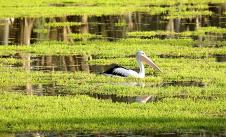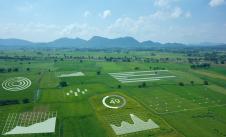Background
Environmental-economic accounting (EEA) considers what value the natural environment provides to society.
It extends beyond economic value to consider the societal value provided by the natural environment and interactions between the economy and the environment.
For example, urban parks, market gardens, rivers and lakes provide food and recreational opportunities, as well as regulating noise, air quality, and climates. These environmental goods and services lead to a range of health, wellbeing and financial benefits.
The intention of EEA is to ensure prosperity can be sustained into the future. It seeks to do this by recognising the status of the underlying stock of environmental assets on which the economy and society depends (acknowledging the costs of economic growth such as pollution, habitat loss etc.).
Ultimately EEA strengthens our ability to recognise the benefits of protecting and investing in the natural environment.
This broader framing of value provides decision makers with an understanding of the total societal value provided by the natural environment.
UN System of Environmental Economic Accounting
The United Nations System of Environmental Economic Accounting (SEEA) is a framework for reporting on links between the environment and the economy using internationally agreed on accounting concepts.
The framework is consistent with the international standard of System of National Accounts (i.e. GDP) to report on the interactions between the economy and the environment nationally.
EEA gained momentum at the 1992 Rio “Earth Summit” which recognised the need for holistic indicators of society’s development beyond economic output (i.e. Gross Domestic Product - GDP) to include broader social and environmental indicators.
Worldwide, governments including Australian Commonwealth, state and territory governments, have begun developing and implementing EEA to inform public policy development.
The Australian Government has a National Strategy and Action Plan for a common approach to EEA, endorsed by Environment Ministers in April 2018.
Ecosystem accounts
Ecosystem accounts are a type of EEA that take stock of current ecosystem assets – in terms of their extent, location, and condition – and quantify and value the flow of ecosystem services that these assets generate for people, who enjoy benefits from them.
The interactions between the economy and the environment are reported on in ecosystem accounts by isolating the contribution of the environment to goods and services that are captured in conventional economic (GDP) accounts.
The accounting framework includes broader (“non-market”/public good) values that are supported by the environment (and delivered by government), but which are not captured within GDP accounts.
Ecosystem accounts in Victoria
A baseline environmental-economic account (EEA) for urban Melbourne has been prepared by DEECA and aligns with the UN System of Environmental-Economic Accounting - Ecosystem Accounts guidance.
The urban Melbourne EEA integrates the best available data, and identifies evidence gaps, to communicate the economic benefits of urban Melbourne ecosystems.
In Victoria, there is much data and analysis on the socio-economic value of ecosystems (green and blue infrastructure) in Victoria and Melbourne. However, it is not currently consolidated to be useful for decision makers.
EEA will support government policy, planning and investment decisions affecting the environment. It also strengthens the ability of local government, business, not-for-profit and community stakeholders to recognise benefits of protecting and investing in the environment.
Refer to the State of the Environment 2023 Report to learn more about the ecosystem accounting framework.















